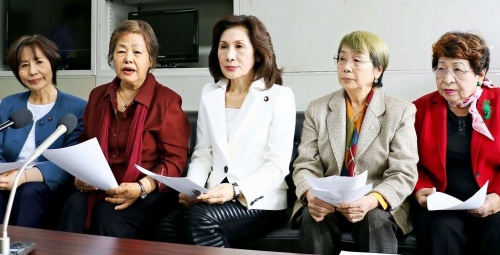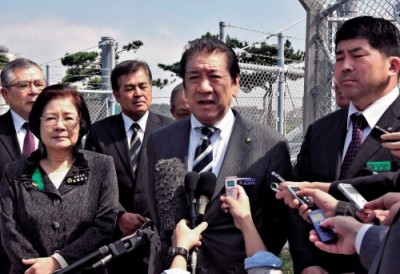Anger spreads in response to alleged rape by US soldier

Okinawa Women Act Against Military Violence co-representative Suzuyo Takazato (second from left) and others speak at a press conference on March 15 at the Okinawa Prefectural Office
March 16, 2016 Ryukyu Shimpo
After a U.S. soldier was accused of raping a woman in Naha on March 13, voices of protest arose from many corners, including Okinawan women’s groups and the mayors of cities and towns hosting U.S. bases. Widespread protests were held on March 15. After protesting on March 15, Okinawa Women Act Against Military Violence, a women’s rights group jointly represented by Suzuyo Takazato and Keiko Itokazu, held a press conference at the Okinawa Prefectural Office. There they released a written statement demanding an apology to the victim and the total prohibition of U.S. soldier activity off-base, among other measures. On the same day, a group comprised of representatives from cities and towns in Okinawa that host U.S. bases also expressed their protests to the U.S. military stationed in Okinawa. The Naha City Council has drawn up a statement demanding full compensation to the victim and the implementation of measures to prevent such incidents in the future, as well as a protest resolution, both of which it plans to pass at its scheduled regular meeting on March 17.
The statement released by Okinawa Women Act Against Military Violence is titled, “Appeal for sufficient measures to compensate the victim and for the withdrawal of U.S. forces.” It refers to the repeated incidents of sexual violence perpetrated by U.S. military personnel in Naha, and points out that the crimes must be viewed not as individual criminal acts, but as a form of structural violence perpetrated by the U.S. military troops stationed in Okinawa.
The statement further reminds us of attempted rapes by U.S. military personnel in 2010 and 2012, and demands the following: (1) Measures to protect the privacy of the victim and guarantee her proper physical and psychological care; (2) An apology to the victim and strict and impartial punishment for the perpetrator; (3) Prohibition of all off-base activity by U.S. military personnel; (4) Drastic revision to the Status of Forces Agreement; and (5) Complete withdrawal of all U.S. bases and troops stationed in Okinawa.
The accused soldier was stationed at U.S. Camp Schwab, and the group’s statement also raised the ongoing protests in front of the Camp Schwab gate against the construction of a new U.S. military facility off of Camp Schwab. “[This incident] shows that the U.S. military lacks appreciation for human rights and is utterly incognizant of the ongoing protests,” the statement declares. The statement will be sent to Japanese Prime Minister Shinzo Abe, U.S. President Barack Obama, and related organizations in Japan and the United States.
At the press conference, Okinawa Women Act Against Military Violence co-representative Suzuyo Takazato pointed out that recently, it has become increasingly common for U.S. military personnel to elude the curfew set under the Liberty Regulations, designed to prevent accidents and crimes off-base, and spend the night in Naha, Okinawa’s capital. “The U.S. and Japanese governments must come up with concrete measures to prevent U.S. military personnel from [evading regulations] and returning to the base in the morning,” Takazato said.
“The U.S. and Japanese governments state that they are endeavoring to enforce strict discipline and prevent reoccurrence, but the crimes do not cease. As long as U.S. troops are stationed in Okinawa, these incidents will continue,” said Keiko Itokazu, the group’s other co-representative.
[Kitanakagusuku] The Okinawa Council to Promote Conversion of Military Land to Civilian Use and Consider Military Base Issues is made up of representatives from the Okinawa prefectural government and municipal government bodies in cities and towns that host U.S. military bases. On March 15, the group protested the recent rape incident to the U.S. Consulate in Okinawa and to the Okinawa Area Field Office of United States Forces Japan. Among its demands were a reduction of the disproportionate burden of U.S. military bases in Okinawa and the cessation of operation of Marine Corps Air Station Futenma by February 2019.

Okinawa City Mayor Sachio Kuwae (front row, center) and Naha Mayor Mikiko Shiroma (front row, left) speak to the press after engaging in protest action on March 15 in front of Camp Foster in Kitanakagusuku
Vice chair of the group, Okinawa City Mayor Sachio Kuwae, told the press, “We must prevent this sort of incident from occurring Okinawa, which hosts many U.S. bases. [Okinawa’s residents] cannot hide their feelings of unease.” Regarding the continual reoccurrence of accidents and crimes related to the U.S. military, he said, “These incidents cannot be tolerated. If the same thing happens again, it will cause an eruption in popular sentiment.” Mayor Kuwae encouraged all parties to pay attention to the pent-up anger held by people in Okinawa.
The group had already been planning to petition for a reduction of the burden of U.S. military bases borne by Okinawa on March 15, but after the incident on March 13, it included a protest against the incident as part of its appeal. The document it drew up to protest the incident states, “Prior efforts to enforce discipline have been insufficient, and the lessons of the past have not been properly acted upon. We hereby express our indignation and strongly protest [the incident].” Participants in the protest action included Mikiko Shiroma, mayor of Naha, where the incident occurred, and heads of other local government bodies that comprise the group. Mayor Shiroma is said to have expressed that the incident sent shockwaves through Naha, which is a popular tourist destination.
According to Okinawa City Mayor Sachio Kuwae, the group was received by U.S. Consul General Joel Ehrendreich, who expressed his deep dismay at the incident. Okinawa Area Field Office chief and U.S. Army Colonel Brady Crosier is said to have told the group that his office would cooperate fully with the investigation and ensure the thorough implementation of education programs for U.S. military personnel going forward.
(English translation by T&CT and Sandi Aritza)
Previous Article:Onaga requests countermeasures to sexual assault allegedly by US military personnel upon receiving apology
Next Article:Naha City Assembly resolves to protest against alleged rape by US sailor
[Similar Articles]
- Protesters numbering 2,500 request ban on US military personnel staying at lodging off base
- Naha City Assembly resolves to protest against alleged rape by US sailor
- 2,000 rally in silent protest in front of US base, mourning the death of a woman
- Citizen group protests assault by U.S. Marine
- Two U.S. sailors accused of rape. Heads of Okinawa municipalities voice their indignation: “The only way to resolve this problem is to remove the bases”
 Webcam(Kokusai Street)
Webcam(Kokusai Street)


